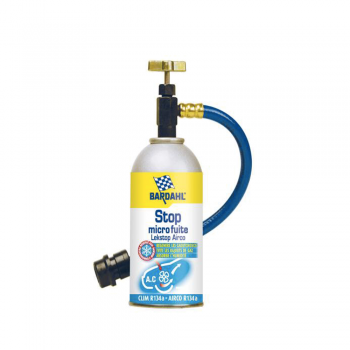
Stop Micro Leak
ref. 4436
Stop Micro Leak - Bottle
- Regenerates rubber.
- Avoids the refill of refrigerant.
- Eliminates humidity of the system.
- R12-R32-R134A stop micro leak adaptor.
Instructions For Use Manual
1 - Remove any refrigerant contained in the air conditioning system.
2 – Put the system under vacuum mode for 5 minutes. NB: If you are unable produce a depression of by 0.80 bar within 5 minutes and
maintain it at 0.80 bar for another 5 minutes, it means that the hole is too large to
be repaired by the product. It is also possible to have several micro- leaks that can
therefore be repaired. Nitrogen may also be used to measure the degree of leaks.
3 - Create and maintain a depression of 0.80 bar for at least 30 minutes to extract
humidity completely from the system.
4 - Turn tap (A) anti-clockwise until the piercing needle (B) is under the black joint.
5 - Carefully screw the bottle (C) onto the thread (B).
6 - Remove the vacuum connection on the low pressure side of the air conditioning unit, and connect
the quick coupling connector (D) to the low pressure side.
7 - Continue to vacuum process for 1 minute. Remove the low-pressure quick coupling connector (D).
8 - Recharge the aircon system following the manufacturers’ guidelines.
9 - Start the engine, switch on the air con system after checking that the compressor is working
correctly.
IMPORTANT: Check the pressure of the aircon system before using BARDAHL Stop Leak.
10 - Turn off the engine and connect the adapter (D) to the low-pressure side of the air conditioning unit.
11 - Turn tap (A) clockwise until it is completely open.
12 - Hold bottle (C) upside down and release the product by turning the tap (A) anti-clockwise. Shake
the bottle so that the coolant gas mixes with BARDAHL Stop Leak.
13 - Turn on the engine, switch on the air con system and the compressor for 2 or 3 minutes until the
bottle is empty.
14 - Turn off the engine and disconnect.
15 - Turn the aircon system on for 20 minutes to enable the Stop Leak to circulate and seal the leaks.
16 - Control the ventilation temperature, as well as the pressure on both high and low-pressure sides.
17 - Seal security clips (E) on high and low-pressures ends to avoid any second treatment to be made.